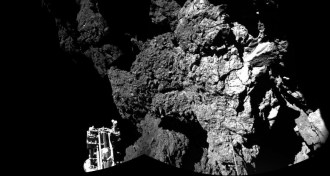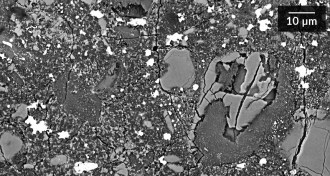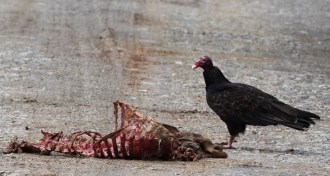Uncategorized
-
 Life
LifeTadpole eye transplant shows new way to grow nerves
Wiring replacement organs into the body may be as easy as discharging a biological battery, new experiments with tadpoles suggest.
-
 Health & Medicine
Health & MedicineChildren can suffer emotional wounds in a disaster
Natural disasters and terrorist attacks have taught researchers that a subset of children may face long-term problems. Parent reactions and how quickly life returns to normal can make a difference.
By Laura Beil -
 Physics
PhysicsAssaulting ink drops for science
A pulse of laser light obliterates a free-falling ink drop in an image from the American Physical Society’s 2014 Gallery of Fluid Motion competition. The work may help engineers build the next generation of computer chips.
By Andrew Grant -
 Science & Society
Science & Society‘Race Unmasked’ explores science’s racial past, present
Eugenics is far behind us, but a health historian sees few reasons to believe science is postracial.
By Bryan Bello -
 Planetary Science
Planetary ScienceComet lander’s exploration cut short
The comet lander Philae made history with its touchdown on comet 67P/Churyumov–Gerasimenko, but a series of small hiccups prevented the robot from recharging its batteries, giving it only about 57 hours to explore the alien world.
-
 Earth
EarthEarth’s most abundant mineral finally has a name
Bridgmanite, the planet’s most common mineral, christened after traces found in 1879 meteorite.
-
 Health & Medicine
Health & MedicineTurning the immune system on cancer
A new class of drugs uncloaks tumors in some patients, awakening home-grown cells to fight several cancer types.
By Nathan Seppa -
 Animals
AnimalsVulture guts are filled with noxious bacteria
Vultures’ guts are chock-full of bacteria that sicken other creatures.
-
 Tech
TechBlu-ray Discs get repurposed to improve solar cells
Polymer solar cells capture more sunlight when they are imprinted with movies’ and TV shows’ Blu-ray Disc etchings.
By Andrew Grant -
 Archaeology
ArchaeologyGolden Fleece myth was based on real events, geologists contend
Jason’s legend grew out of long-distance trade with people who used sheepskins to collect gold.
By Bruce Bower -
 Physics
PhysicsMaterial borders support unusually warm electronic superhighways
The interface between a conductive wafer and an iron-containing film is a high-temperature superconductor, which transmits electrons without resistance.
By Andrew Grant -
 Oceans
OceansRobotic subs reveal thicker Antarctic sea ice
New measurements by robotic subs suggest that scientists have underestimated Antarctic sea ice thickness.